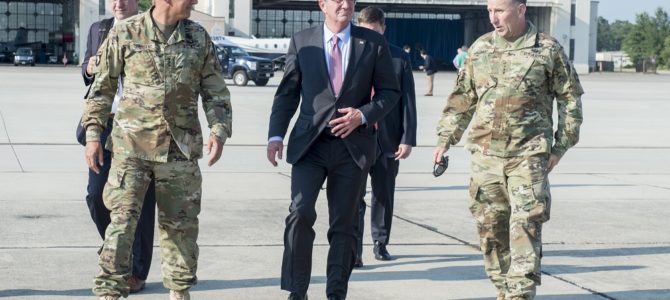
Many of President Trump’s strongest supporters are hailing as a major accomplishment the operation he ordered that killed Islamic State leader Bakr al-Baghdadi. His critics say he still hasn’t done enough to eradicate ISIS and should continue to fight them in Syria.
The ground truth, however, is that both are wrong on a fundamental point: remaining actively engaged militarily in the Middle East only deepens our strategic failure and extends the forever war that Trump has repeatedly criticized.
One of the most common misunderstandings of what’s happening in northern Syria is that the U.S. withdrawal from Syria following Turkey’s incursion would create a vacuum our adversaries would fill. A sober analysis, however, reveals that there is no vacuum to fill and the net result of this reshuffling would be a return to the pre-war status quo.
This is crucial to understand: American security was never at risk in Syria prior to former President Obama’s deployment of U.S. troops to Syria in 2014. It was never at risk during our five-year intervention. And it will not be at risk after the last American boot leaves Syrian soil. That’s true regardless of what Turkey, the Assad regime, the Kurds, Russia, or any other actors in Syria’s civil war do next.
Unlike the United States, those other actors actually have major interests at stake in Syria. Russia has been Syria’s on-again-off-again ally for decades. Iran’s close relationship with Damascus goes back years. Turkey has been concerned about Syrian Kurds since at least 2004, a decade before the Islamic State arose. All of these forces oppose ISIS. As I have written many times over the years, ISIS was always a dead man walking and would have been defeated by regional powers without U.S. help had we shown sufficient patience.
In April and August 2016, I spent considerable time on the frontlines of the battle against ISIS in Iraq with the Kurdish Peshmerga opposite Mosul. My experience, gained through four combat deployments during my 21-year military career, showed me it was always clear that ISIS was overwhelmed just trying to administer and defend the territory it seized. It was incapable of mounting a serious threat to the United States. Obama should have known that and never introduced U.S. troops into that chaos.
Just months after Trump’s 2017 inauguration, I wrote that our continued presence with the Syrian Democratic Forces (SDF) carried real risks. “Are American strategic interests served by supporting the SDF to drive ISIS out of Raqqa,” I asked, “if doing so ruptures our relations with Turkey?” Supporting the Kurds in Syria, I also warned, could have “serious second- and third-order effects, some of which could have a negative impact on U.S. security.”
In early 2018 I explicitly cautioned that even though Raqqa had fallen, “the trouble is still not over. Recent events have raised the potential for unintentional military clashes between the United States and Turkey. […] Instead of trying desperately to remain in Iraq and Syria to perpetuate these failures, Washington must wind down its combat missions in the Middle East, redeploy its troops to their home bases.” Had we done so then in a coordinated way with our allies, the chaos reigning in northern Syria today would never have happened.
Yet even under the current, less-than-ideal circumstances, U.S. national security still is not put at risk by withdrawing from Syria. America is secure from ISIS, al-Qaeda, and any other global terror threat, regardless of where in the world the threat originates, by our powerful global intelligence, surveillance, and reconnaissance capabilities coupled with our ability to launch targeted strikes.
We don’t need troops on the ground in Syria to do that. What we very much need to do, however, is remove our troops from the constant threats they face in Syria, Iraq, and elsewhere in the Middle East. Although we should have left these conflicts years ago, leaving now is still the right answer.
Every day we keep American service members in harm’s way fighting missions disconnected from our national security, we continue risking unintentional conflicts with our NATO ally Turkey, Russian troops, Iranian forces, or any of the dozens of other violent Islamic groups. Before we suffer any more unnecessary casualties or are sucked into a larger and more disastrous war, we must fully withdraw all our troops from the endless war in Syria.








